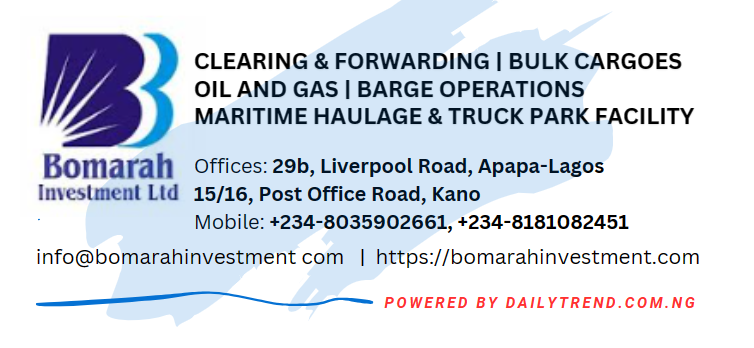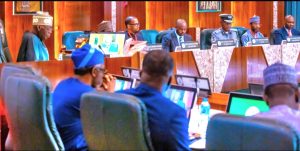BLUE ECONOMY: Nigerian Lawmakers Pursue Legal, Regulatory Framework for Oceans and Seas

By DAPO OLAWUNI
As Nigeria joins the rest of the world to commemorate the 2020 African Union Day of the Oceans and Seas in Lagos on Saturday, Honourable Kayode Akiolu, Member, Federal House of Representatives, representing Lagos Island has assured that the National Assembly would fashion out a better legal and regulatory framework for seas and oceans.
The theme for this year’s celebration was “Innovation for sustainable ocean”
The event was organised and coordinated virtually by Honourable Violet Olaitan Williams ,the Founder of Ocean Ambassadors Foundation in conjunction with Mundus Maris ASBL by organizing.
The virtual programme had over a hundred global audience with participants from: Namibia, South Africa, Bangladesh,Tunisia, UK, Ghana, Cameroon,Kenya,Egypt and many others.
Hon Akiolu while speaking at the programme charged Nigeria and the maritime agencies and stakeholders to stop her act of “eye service” and take part in making the Blue Economy a reality as it is one of the United Nations Sustainable Developmental Goals and also it is an integral part of the African Economy.
He stressed on the importance and benefits of the water bodies, saying that most of the protein humans consume is from the water bodies and also, over 3 billion people depend on maritime for livelihood.
He advised that the humongous potential of the oceans needs to be explored and maximized by incorporating a healthier manner of harnessing the emerging sectors of Marine Biotechnology, Deep-sea mining, Offshore Renewable Energy and Eco-tourism amongst others in Africa.
He said “Review of our environmental laws and practices were needed as this is an area where some of us have a major role to play and I pledge that a good part of my time, resources and influence will be expended in fashioning better legal and regulatory framework for seas and oceans.”
“The Courts are beginning to hold fossil fuel producers accountable for the damage they know their products were causing because they chose to misinform investors and the public about those risks instead of acting to mitigate them”
“Making a case for these companies’ responsibility, Henry Shue, a professor of politics and international relations at the University of Oxford, argues
“Companies knowingly violated the most basic moral principle of ‘do no harm,’ and now they must remedy the harm they caused by paying damages and their proportion of adaptation costs, emphasising that scientific findings that show the extent of the damage caused by carbon pollution can inform those efforts.”
The lawmaker further stressed the need for capable hands in the drive for the much needed change in the maritime sector.
Dr Kayode Olubiyi, Senior Lecturer, Federal College of Fisheries and Marine Technology while speaking at the Webinar also advocated proper education of Africans on the wealth of oceans.
Olubiyi said adequate understanding of the worth of the oceans would ensure that its $24 trillion worth of resources would be well utilised.
According to the Don, if Africa can manage the various resources emanating from the ocean such as wildlife, beaches, movement of materials and goods from one country to another, in a sustainable way, it will be to its advantage.
He said that the way the ocean was being treated in Africa was not healthy, noting that waste – both liquid and solid from land – polluted the ocean and led to serious damage.
“The way forward is that we must take decisions and work to having a Sustainable Blue Business Plan.
Olubiyi said that there should be a better way of waste disposal through recycling.
He also urged stoppage of the use of plastic bottles or polythene and end to dredging.
He said that Africans should see ocean as commonwealth that must be protected and utilised to generate power.
Dr Alban Igwe, Director, Council for Regulation of Freight Forwarding in Nigeria (CRFFN), said at the event that 38 African countries had the benefit of coastal water and should reap the opportunities that abounded on the sea.
Igwe spoke on: “Sustainable Supply Chain: Linking the African Coastal States”.
He said that opportunities abounded on the African sea.
According to him, Africa is the second largest continent and has 100 ports surrounded by 30,500km coastline.
The director said that Africa should tackle illegal fishing worth $1 billion.
He noted that the continent’s 90 per cent import and export were by sea, adding that it had access to Atlantic, Indian, Mediterranean and Arabian sea routes.
He called for the development of the Blue Economy Road Map, creation of a regional blue centre in Kenya (East), Nigeria (West), Morocco (North) and South Africa (South), to help utilise the opportunities.
“We need to make progress by also investing in human capital, defining competitive strategy and setting realistic timelines and action plans,” he said.
According to Igwe, the supply chain is the right strategy in today’s world as it connects people.
He said that the strategy unleashed creativity, ensured effective utilisation of resources and connected dots for more efficiency.
Mrs Jean Chiazo-Anishere, Continental President, Women in Maritime (Africa), said that the first step for African countries to take would be integrating skills development strategy into development plans.
Chiazo-Anishere spoke on the topic: “Building on Human Resource Capital for the Future of African Maritime Economy”.
She said that the maritime industry played a prominent role in any economy and, when handled wisely, could reduce poverty, lead to skills acquisition and others benefits.
“Education is key in building human capital; investing in it will lead to productivity; so, there is the need for continuous review of educational system to ensure relevance, and the curriculum should align.
“There should be establishment of an industry-owned training institute, private sector investment and participation in education to complement government efforts,” she said.
In her contribution, Prof. Stella Williams, Vice President, Mundus Maris ASBL, said that fisheries and aquaculture would help to sustain the ocean and promote the economy.
She added that there was the need to teach young Africans to understand the ocean, identify and adopt relevant research results and abide by the many sustainable goals for the ocean.
According to her, there should be collective actions that will propel both men and women in the sector.
She listed the actions to include education.
“To scale things up, there is need to keep the pressure on reforms, strengthen local capacity and enlarge the academy for intellectual platform.”
On her part, Founder of Ocean Ambassadors Foundation, Hon. Violet Olaitan Williams said that the foundation was joining the African Union in its agenda of African Integrated Maritime Strategy 2050 in order to increase awareness among stakeholders.
He said “This is the only way to create awareness for the upcoming generation about the wealth of the oceans, and to educate them on how best to sustain it, by having an ocean that is clean, in order to get the best out of it for human survival”
She stressed that partnership from Nigerian government, both Federal and State level to passionate Non Governmental Organisations (NGO) are welcomed so that the wealth of the African oceans can be realized through African Clusters.







